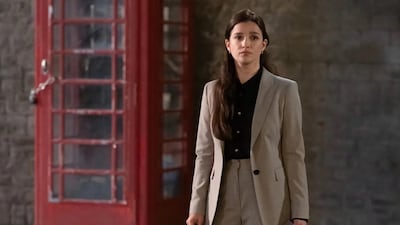The TV series Industry has been praised for its realism as well as its diversity of cast.
The popular HBO/BBC co-production returns to our screens at the weekend for a second season, following the long days, and even longer nights, of the young employees of fictional London investment bank Pierpoint & Co.
The first season, written by former London bankers Mickey Down and Konrad Kay, introduced a world where, as long as you are making money for the bank, little else matters, leading to a toxic work culture of bullying, harassment and some very questionable morals.
When it comes to depictions of investment banking — and the industry itself — the genre has typically been populated by white men a la The Wolf of Wall Street and The Big Short. The trading floor of Pierpoint, however, features a refreshingly mixed bunch of aspiring Gordon Geckos. This includes Myha’la Herrold’s Harper Stern, a young black woman uprooted from her native New York, and who lied about her qualifications to try and make her fortune among the old boys network of London’s financial district. There's also Ken Leung’s Asian-American manager Eric Tao and Harry Lawtey’s Robert Spearing, who is Welsh, working-class, and an Oxford graduate.

Then there's the character of Yasmin Kara-Hanani, played by Marisa Abela. Yasmin is the British-raised child of wealthy Lebanese parents who, as well as demonstrating the ability to flit effortlessly between Western and Arabic cultural norms, is fluent in English, Arabic, Spanish, German and French.
Like Yasmin, Abela was raised in the UK, but her heritage is Maltese, Libyan, Russian and Polish. So how closely does her own multicultural background mirror that of her character?
“Well, I am someone whose mum and dad come from completely different cultures — my dad is Maltese Arab, and my mum is from a family of Polish Jewish refugees,” she tells The National. “You'll see this season that Yasmin's dad is more similar to my mum’s heritage, and her mum’s is most similar to my dad’s. Like Yasmin, my parents are separated, and we both grew up and went to boarding school in England. But the thing I relate to most is that those two cultures can be quite divisive, and you can feel like you're being pulled in different directions.”
Despite the surface similarities, and the shared experience of being sometimes caught between two worlds, Abela admits that Yasmin’s polyglot nature is not one she closely relates to. “Oh no, not at all,” she says with a laugh. “I spoke Spanish at school, and that was about it. I love languages though and it's always a nice challenge when Yasmin has to speak French or Arabic.”

As part of that challenge, Abela was required to take classes for many of Yasmin’s multilingual lines, and she didn’t have to look too far from home for assistance with the Arabic dialogue. The Maltese language is the only surviving example of the Arabic dialects that were spoken in the European Mediterranean in the Middle Ages, and the only Semitic language which is written in Latin Script. About a third of Maltese words, not to mention almost all of its grammar, come directly from Arabic, while research by the Linguistics Society of Europe has found that as much as 40 per cent of Maltese can be understood by speakers of Maghrebi Arabic, and vice versa.
With most of Abela’s paternal family still living in Malta, she had a convenient place to turn to for a crash course. “Maltese has a lot of Arabic in it — counting to 10 in Maltese is exactly the same as counting to 10 in Arabic — so it wasn't something I was coming completely new to,” Abela explains. “I used my grandad to learn all of the Arabic he could teach me through Maltese, in particular, to get the sounds right, because they’re totally different. It’s not like French or Spanish, the Arabic sounds sit in a totally different part of the mouth, so I tried to get all that right first, and then when it came to the actual classes, I really took them seriously as I was determined to get it right.”
While season one of Industry was heavy on finance and light on back stories (perhaps understandably so because many characters’ identities are almost entirely defined by their work), season two promises to spend more time outside Pierpoint’s walls. We'll get to know plenty more about Yasmin’s family and background, and see if those Arabic lessons have paid off.
For Abela’s co-star Herrold, with whom she shares top billing in the show, there’s another reason to be excited. “I would say this is the only bit of television that you come to through the eyes of young women in the finance industry,” Herrold says. “I don't know of anything else that exists, and we're lucky to be two young women with these really strong storylines leading this show.
“What's exciting about these characters is that they don't fall into any of the tropes a lot of women characters do. For example, at the end of the first season, Marisa and I had a fight, but we were all committed not to make it a ‘catfight’ and fall into stereotypes. It’s been important to me to play a woman who is not what you might assume. That’s refreshing, it’s what makes the show work, and it’s important.”
Industry season 2 comes out on OSN+ on Monday, August 1

